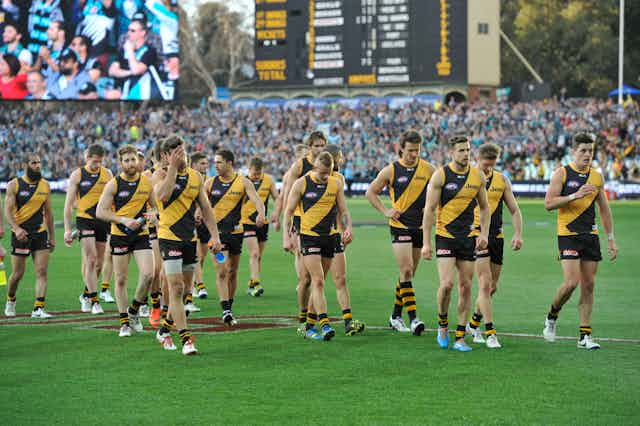The AFL final series – with the semi-finals starting today – is one of the most ferocious and toughest contests we will see in Australian sport.
Behind the scenes, there is no doubt a fair percentage of footballers who will be learning how to cope with a mountain of pressure.
The best players embrace the challenge of finals and tend to feel inspired when the pressure builds. These players know how to use adrenaline to their advantage, and use their peak readiness state to play inspiring football.
But there have been many cases when players “choke” or just can’t get their hands on the ball in the finals. We saw this happen in the first half of the Port Adelaide and Richmond elimination final on Sunday.
The Richmond Tigers invested so much emotional energy in their nine-game winning streak to qualify for the finals. The team’s last home-and-away clash was played like a final, played as a titanic struggle against top-of-the-ladder giants, the Sydney Swans.
The Tigers appeared to experience an emotional release after beating the Swans 68-65 and they simply appeared flat against pumped-up Port. The Tigers eventually lost to Port 132-75.
Emotional readiness is just as important as playing form and fitness. If players aren’t emotionally in tune to playing finals football, they will appear flat-footed in the frenetic pace of top-class games.
Why some players ‘choke’

Inexperienced players often “choke” or become over-anxious or over-aroused during huge finals games – and this is caused by performance anxiety and pressure.
Some footballers will be over-excited but it takes mental focus and maturity to handle big-game situations. This becomes a test of character – it’s as simple as that.
The reality is that not many psychologists in the world can offer athletes the skills in handling these moments. Managing pressure is often dependent on the make-up of the athlete, the qualities which define them as elite athletes.
If the athlete has the tenacity and character to cope with match pressure, they will often respond to these situations. Players who experience pressure on the training track will often replicate their physical and team skills on match day.
Footballers are told to treat each finals game like a normal game, as they cope in blocking out external distractions, such as fans, the huge crowds and media scrutiny.
Feel the nerves
Feeling nervous is often a good sign before a big game. Players who strive to play optimally need to find their peak readiness state, which is often a reflection of their emotional state.
Footballers who are too relaxed often appear to start slowly, while over-anxious players can fumble, kick poorly or run at top speed – only to burn unnecessary energy.

It’s healthy for athletes to feel a little nervous and excited, releasing the adrenaline to perform at their peak. The physiological reaction needs to happen. Anxiety keeps the body warm and helps to release adrenaline and prepare the body and mind for peak readiness state.
But some players get too nervous and excited – and as a result, some can’t hold down their food or they can even experience gastric upsets. This can affect anywhere from 10% to 20% of players, according to my research so far.
Footballers who can handle the pressure well usually perform better in finals.
Experienced and stable AFL teams, who finish in the top four, usually resist pressure and ease into big games. That’s why it’s hard to go past Sydney and Hawthorn – and it’s no surprise they qualified for preliminary final berths.
The players will be extremely focused on their football and will virtually live in a bubble in these final weeks. They will find comfort in a normal routine with support from family and friends. The most successful players say maintaining a normal routine, without feeling overwhelmed by the occasion, will help them perform at their peak.
After all, they are professional footballers and they are expected to learn physical and mental techniques which will allow them to perform optimally.
Qualifying for the AFL Grand Final is the dream of every footballer, and it’s this privilege that drives the players during the build-up to this magnificent event.
Get your tips here
I am tipping the Geelong Cats to beat North Melbourne in the second of two semi-finals, played tomorrow.
Cats captain Joel Selwood is an excellent leader and will guide players who have experienced the highs and lows of finals football. The Cats are still bitterly disappointed after losing to Hawthorn in last year’s preliminary final.

I believe Fremantle will beat Port Adelaide in the first semi-final, played this evening. Fremantle’s Ross Lyon is one of the best coaches in the AFL and he will likely guide the Dockers to a preliminary final berth against Hawthorn.
We could see another Hawthorn-Swans Grand Final this year, to be played Saturday September 27 at the MCG. Both teams will benefit from the week’s rest and they both have stable line-ups.
Hawthorn and Sydney handle pressure better than Geelong or Fremantle, and will draw on last year’s finals experience.
But don’t be surprised if the Cats or Dockers threaten the league leaders. They are very well coached and have the fire and tenacity to challenge the benchmark teams.

